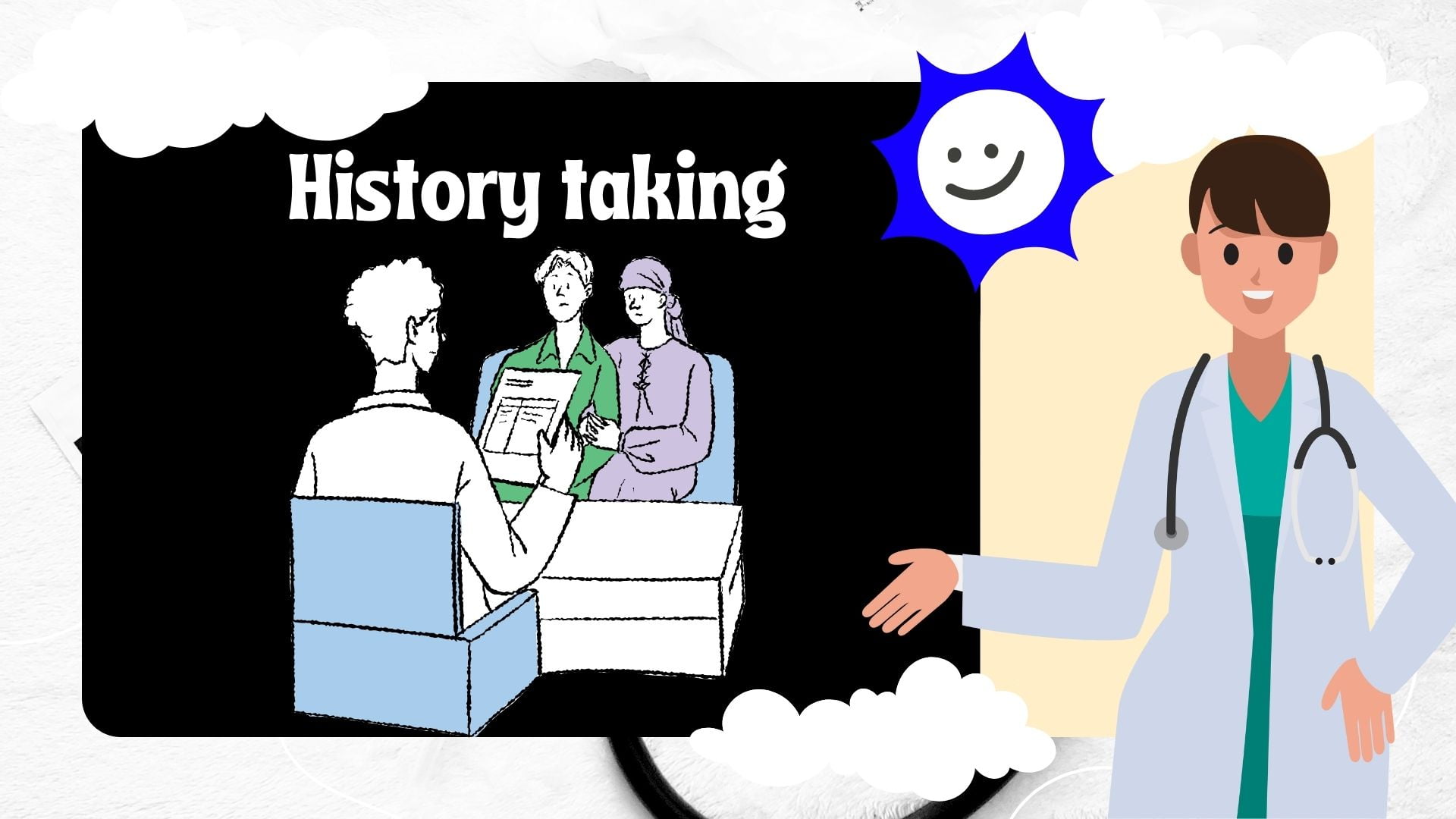Complete Guidelines on How to Take Case History in Pediatrics:
Are you ready to study the fundamental steps and techniques for case History In Pediatrics? Learn vital information about gathering the information required to give young patients the best care possible.

What is history taking?
It is a process in which information is taken from the patient related to the disease by a physician for provisional diagnosis.
Importance of History Taking:
Taking an accurate history is a critical first step for a provisional diagnosis.
Accurate diagnosis in medicine is based on:
- Clinical History,
- Physical Examination,
- Lab Investigation
Provisional diagnosis 70% depends on accurate history taking and 30% on lab investigations.
What is the basis of true history?
Good communication between physicians and patients. History-taking needs practice, patience, understanding, and concentration.
Approach to history taking:
- Take consent to take a history of the patient.
- Ensure such a friendly environment to ensure patients feel comfortable.
- Physicians should try to see things from the patient’s point of view.
- Keep privacy and dignity.
What are the Main components of history taking?
- Complete the Patient’s Biographic data
- Chief complaint due to which the patient is seeking medical care,
- Histories of presenting complaints,
- Past medical history,
- Birth history,
- Antenatal history,
- Post-natal history,
- Feeding history,
- Vaccination history,
- Developmental history,
- Family history,
- Social history,
- Drug history,
Is there any difference between child history and adult history?
History of adult and child should be taken in the same pattern but child history differs in:
- Birth history,
- Feeding or Nutrition history,
- Vaccination history,
- Developmental history,
After taking all above mention histories then:
- General physical examination,
- Anthropometric measurements,
- Head and neck examination,
- Eye, Face, and Ear examination,
Once done then begin Complete systemic examination:
- Respiratory system,
- Cardiovascular system,
- Gastrointestinal system,
- Abdomen,
- The central nervous system,

Let’s completely explain the history-taking of children in detail.
Keep in mind that birth to 12 years is considered a child.
First take the biographic data of the child which include:
- Name,
- Age,
- Sex,
- Source of history,
- Father name,
- Address
What is the Chief complaint?
The main reason for which the patient is seeking medical care is by visiting a physician. Usually, the chief complaint may be a single symptom or maybe more than one like pain, fever, cough, etc.
If a patient complains more than one complaint then those should be written according to chronological order.
Like
- Fever 2 weeks,
- Dry cough 1 week,
- Vomiting 2 days
- Fatigue 1
History of presenting complaints?
- Elaborate on the chief complaint in detail,
- Start asking with open-ended questions (Open Question: Allow the patient to express his or her own thought and feelings) and take time to listen to the patient’s story.
- Once the patient completes his/her narrative now close questions(Closed Question: These are requests for factual information like when did the pain start?) should be asked to clarify.
- Never ask a leading question.
- Ask the patient about the associated symptoms,
Avoid medical terminologies and use descriptive language that is familiar to patients.
Use the SOCRATES formula to get information:
What is the SOCRATES formula?
- S-Site
- O-Onset
- C-Character
- R-Radiation
- A-Alleviating Factors
- T-Timing
- E-Exacerbating Factors
- S-Severity
Past Medical History:
- Ask the patient about similar complaints in the past.
- Any allergic history.
- Any medical problems like Hypertension, Diabetes, Tuberculosis, Epilepsy, Myocardial Infarction, etc., which the patient has or had.
Family History:
- Asking patient related to family history is very important to confirm any genetically transmitted disease in families.
- Any acute or chronic disease run in his/her family.
- Ask the patient about any similar history in his/her family.
- Ask about your parents’ life or death, if died ask how old and the cause of death.
- It is important that the physician should be able to collect relevant family history depending upon the present illness if the patient has come due to abdominal pain then try to rule out appendicitis, or stomach pain by asking a relevant question about the disease.
Socioeconomic History:
- Ask about educational background, financial situation, and the area where the patient living.
- Ask the patient about any drug addiction.
- If suspected of Sexually transmitted disease then ask to take a sexual history.
- Ask about occupation and relationship with others.
- If a smoker then ask about the amount, duration, and types.
- If he/she has a drinking history then ask about the amount duration and type.
Gestures of a patient:
Note the gestures of a patient during history taking because it is useful in analyzing specific signs and symptoms like rubbing the sternum to describe heartburn, and a squeezing gesture to describe cardiac pain.
Specific Information:
A patient may have ignored the features of the disease so the physician should put the questions regarding the main presenting feature of systemic review(systemic disease) i.e., disease of the Respiratory system, Cardiovascular system, Central Nervous System, Urinary System, etc.…
Birth history:
- Health and nutritional status of mom during pregnancy (H and N status)
- Illness during pregnancy ( like DM, HTN, Pre-eclampsia, antepartum, hemorrhage)
- Infections during pregnancy ( UTIs, TB, Rubella, etc.)
- Drugs (Multivitamin, iron, other drugs with dose, duration, and at which time of gestation)
- X-rays histories,
- TT (maternal vaccination against tetanus)
- History of past obstetric (Problems with previous pregnancy if any)
History of delivery (Natal History)
- Place of delivery (home/hospital)
- Gestation time (length of pregnancy)
- Labor time,
- Sedation or analgesics used during labor,
- Any complications
Postnatal History:
- 1st Cry (Immediately/Cyanosed/Apneic)
- Basic problems like the need for resuscitations, problems with respiration, sucking or swallowing)
- Birth weight
- Convulsions, cyanosis, jaundice, fever, rash,
- Procedures (exchanges, transfusions, drugs, umbilical artery catheterization.
Feeding History:
Anemic and malnourished conditions are significant in children less than 2 years.
- Feeding onset (after how many hours)
- Types of feed {breast-fed (how much duration) / Bottle fed( at what age, types of bottle fed)
- Uses of supplements (vitamins and iron).
- Weaning (When, amount, and frequency)
- Current diet and changes in diet during illness.
Immunizations:
By checking vaccinations card check
- Types of vaccinations taken
- Doses and adverse effects
Developmental History:
Ask about the following milestones in achieving age:
- Smiling,
- Ability to hold the neck,
- Sit,
- Crawl,
- Stand,
- Walk,
- Talk,
- Control of bladder and bowel,
Features of System Review:
The physician should run through a full list of signs and symptoms from the major body system.
- Special senses like vision, hearing, and touching.
- Respiratory system,
- Cardiovascular system,
- Gastrointestinal History,
- Genitourinary like bladder control, nocturia and dysuria,
- Neuromuscular,
Constitutional:
Ask about symptoms such as a change in appetite, weight gain or loss, a fever, nocturnal sweats, and energy levels.
- Have you experienced any changes in appetite?
- Have you had any unintentional weight loss or gain?
- Have you been experiencing fever or night sweats?
Respiratory:
Ask about any coughing, sputum production, difficulty breathing, wheezing, chest pain, or previous respiratory illnesses.
- Do you have a persistent cough? If so, is there any sputum production?
- Do you experience shortness of breath or wheezing?
- Have you ever had chest pain or been diagnosed with respiratory diseases?
Cardiovascular:
Evaluate heart and blood vessel symptoms such as chest pain, palpitations, breathlessness, leg edema, or high blood pressure.
- Have you experienced any chest pain or discomfort?
- Do you notice palpitations or irregular heartbeats?
- Have you had any swelling in your legs or ankles?
Interval History:
If the patient has previously been in the hospital and has had a complete history, write a summary of each hospitalization.
Gastrointestinal:
Ask about symptoms such as stomach pain, nausea, vomiting, diarrhea, constipation, changes in appetite, or any previous gastrointestinal disease history.
- Do you experience abdominal pain or discomfort?
- Have you had any changes in bowel movements, such as diarrhea or constipation?
- Have you noticed any changes in your appetite or weight?
Genitourinary:
Ask about any genitourinary symptoms, such as frequent urination, urgency, pain or discomfort, changes in the color of the urine, the presence of blood, or a history of kidney or bladder issues. Additional inquiries concerning a woman’s menstrual history and sexual wellness may be pertinent.
- Have you experienced any urinary symptoms like increased frequency or urgency?
- Do you have pain or discomfort during urination?
Musculoskeletal:
Consider symptoms that affect the bones, joints, and muscles, such as pain, stiffness, swelling, and movement restrictions, as well as any history of arthritis or other musculoskeletal illnesses.
Neurological:
Ask about any neurological symptoms such as headaches, vertigo, weakness, numbness or tingling, coordination issues, visual abnormalities, speech issues, seizures, or any previous neurological illnesses.
Dermatological:
Inquire about any skin modifications, rashes, itching, lesions, or other dermatological problems.
Psychiatric:
Examine any indications of psychiatric disorders such as memory issues, changes in appetite, anxiety, sleep abnormalities, or mood swings.
Endocrine:
Inquire about symptoms related to the endocrine system, such as excessive thirst, frequent urination, changes in appetite, aversion to heat or cold, weight fluctuations, or a family history of hormone abnormalities.
Hematological:
Ask the patient whether they have ever experienced anemia, bleeding tendencies, clotting issues, or any other symptoms that might be blood-related.
Conclusion:
Once we have done all these steps then these results can be helpful in directing our further evaluation and help us choose the best course of action, which may include ordering more diagnostic tests, referring patients to experts, or looking at particular symptoms in more detail. The system review is an essential step in gathering a patient’s medical history since it helps uncover potential health problems and create a precise picture of the patient’s overall health.
Click Here to test your medical knowledge with our MCQs.



Very nice and amazing blog ..easy to read and very easy wording to understand.. thanks for sharing
Itís difficult to find educated people about this topic, but you seem like you know what youíre talking about! Thanks
Wow, great article post.Really looking forward to read more. Keep writing.